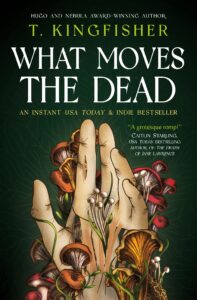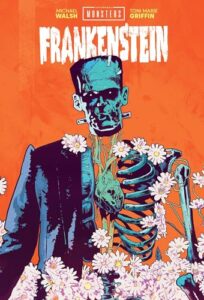When T. Kingfisher, whose real name is Ursula Vernon, was re-reading “The Fall of the House of Usher” two things struck her. The first, as she writes in her author’s note at the end of the book “was that Poe is really into fungi. He devotes more words to the fungal emanations than he does to Madeline.” (p. 171) The second was that, for all the story’s staying power and cultural footprint, it’s short. The length left her wanting explanations. “I wanted to know about Madeline’s illness and why Roderick didn’t just move … it was blindingly obvious to me that Madeline’s illness must have something to do with all that fungus everywhere.” (pp. 171–72) Poe’s first-person narrator remains unnamed, but Kingfisher quickly came up with a name, and a backstory, and quite a lot of cultural background, including locating the Ushers’ house in Ruravia and bits of the narrator’s native Gallacian language.
The setup echoes “Usher”: the narrator travels to the isolated country manor house of an old friend, answering a summons that alludes to a mysterious illness, only to find the patient in dire straits and the surrounding circumstances far stranger and more disturbing than could have been expected from the letter. Alex Easton and Roderick Usher had been soldiers together in the recent war; before that, they were acquainted in their younger years with Roderick’s sister Madeline in the same circle. In expanding the story to novella length, Kingfisher adds characters and background. For example, the Gallacian language has an improbable number of sets of personal pronouns, including ka/kan, which is used exclusively for soldiers.
The Gallacian army fared poorly in many of its wars, leading to a shortage of men available for service. Some years before What Moves the Dead, a woman had presented herself to a recruiter and noted that nothing in the statutes said that she could not serve, as all references to soldiers referred to ka or kan, not once to he or him, nor she or her. She became the first sworn soldier of Gallacia and was ka/kan thereafter. Easton is similarly sworn.









